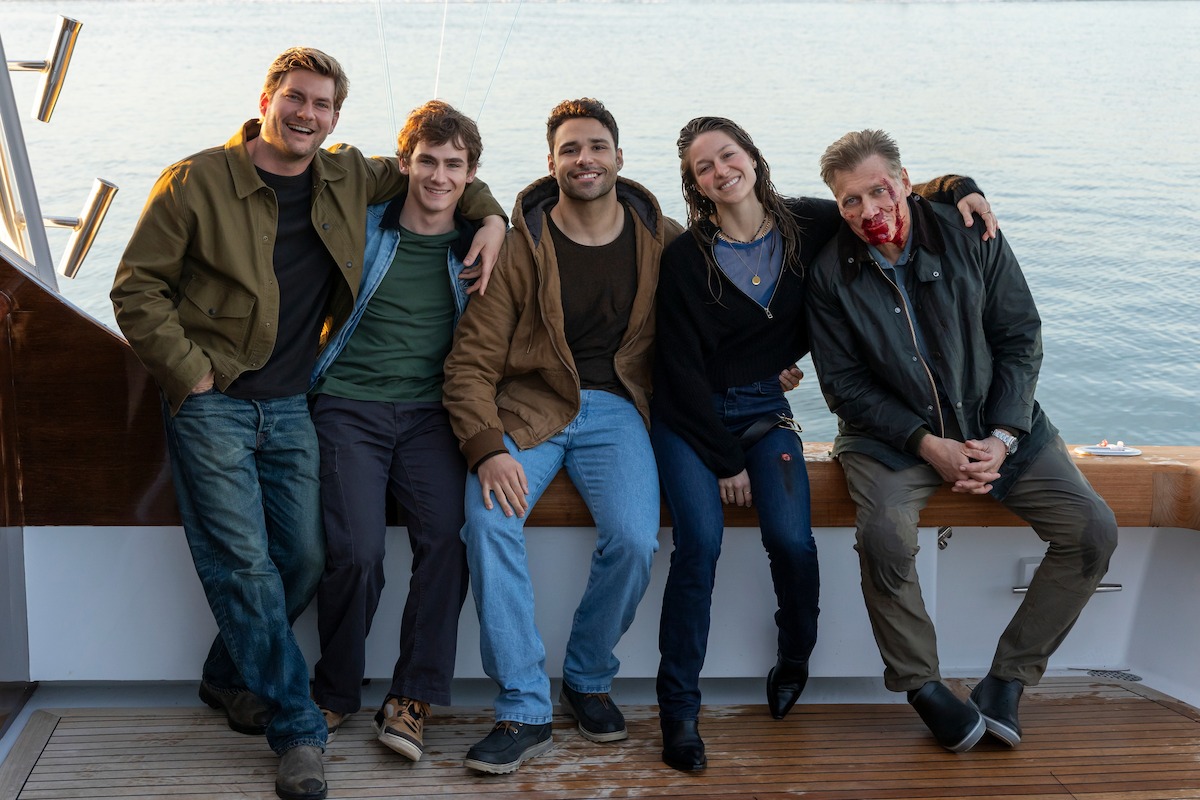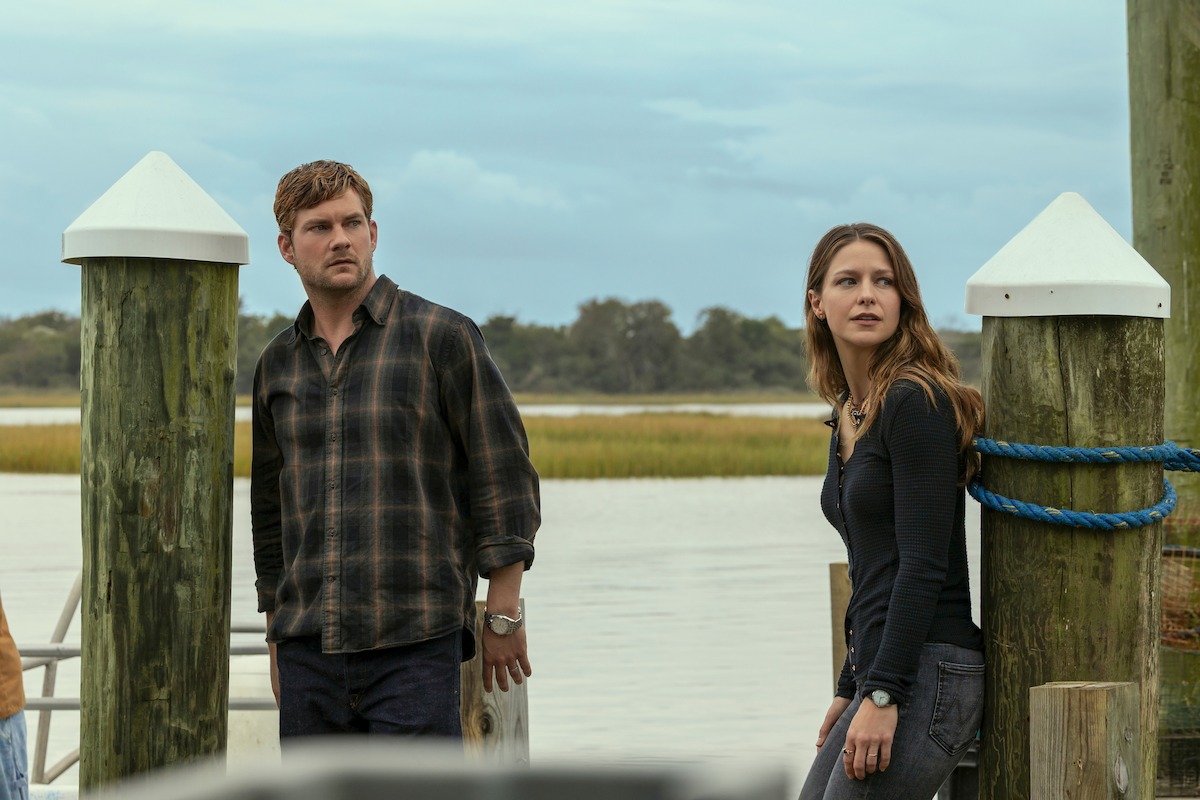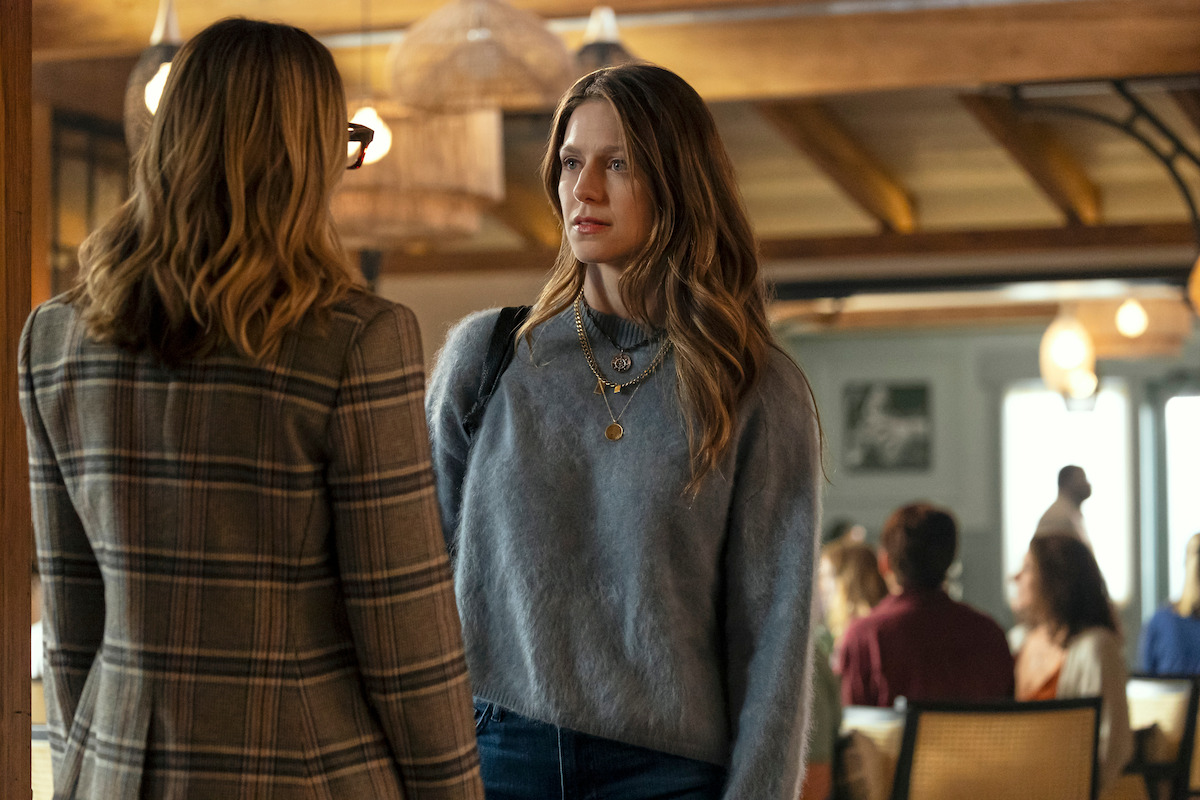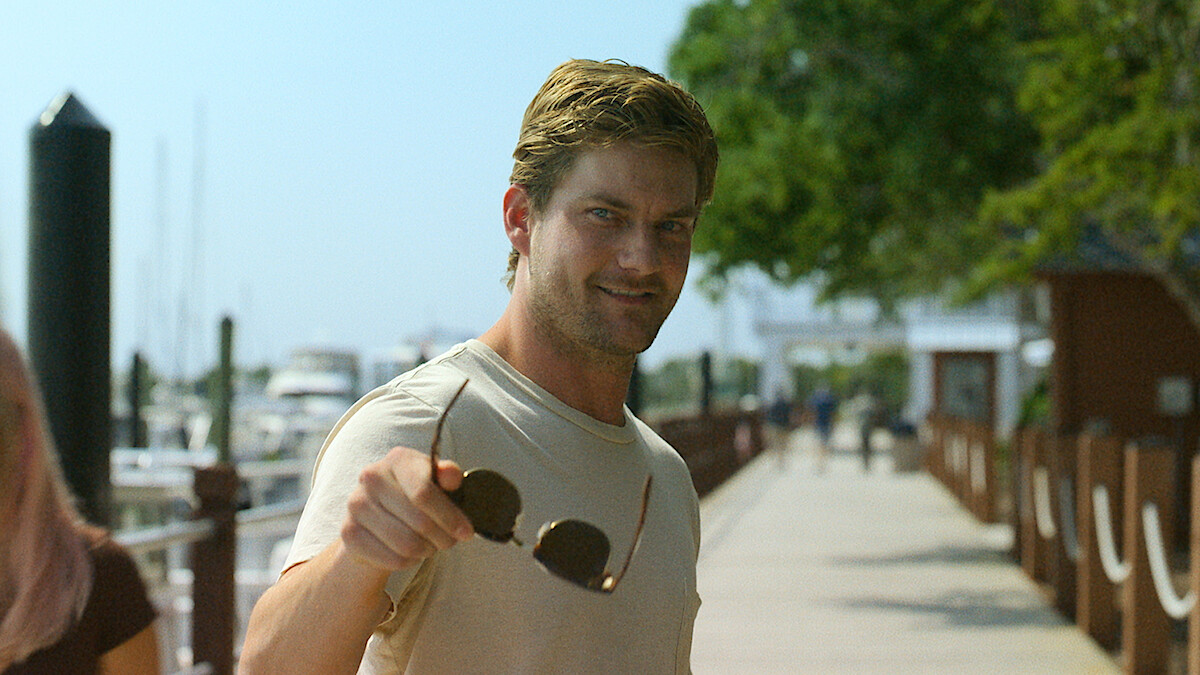This article contains major character or plot details.
Melissa Benoist dives into uncharted territory in The Waterfront.
“I’ve never played a role like this,” Benoist tells Tudum of playing Bree Buckley. “I was really struck by the fact that [creator] Kevin Williamson was going to trust me with it, and felt that I was capable of doing it. Anytime I would get a new script — especially when things really picked up for Bree and we learned her history — I texted him, like, ‘Thank you for trusting me with this.’ ”
Indeed, Bree is nothing like Benoist’s most famous character, the titular Girl of Steel on Supergirl. When we meet the Buckley daughter in The Waterfront, she’s a recovering addict who’s fighting to regain the respect and trust of not only her parents, Harlan and Belle Buckley (Holt McCallany and Maria Bello), but also her resentful teenage son Diller (Brady Hepner), who lives with her ex-husband.
Bree would love nothing more than move beyond her self-destructive streak and find a place in her family’s waterfront empire, even though it’s also struggling. She’s also determined to get revenge on her brother Cane (Jake Weary), who she blames for losing custody of her son. Desperate to find a way back into her family, she joins forces with Marcus, a disgraced DEA agent (Gerardo Celasco) to expose the criminal means Cane employs to keep the Buckleys’ business afloat. In other words, she’s threatening the very thing she wants to be part of.
“I love how messy Bree is,” says Benoist. “She’s reactive. She doesn’t always necessarily think everything through. She’s impulsive, but she’s incredibly loyal. She has so much love to give, and she’s so desperate to be loved and to belong. I could empathize with her.”
In Bree’s defense, she’s not aware of the full extent of the existential dilemma her family faces. With the Buckley legacy on the line, Harlan and Cane strike up a partnership with a capricious and ruthless drug dealer — a last-ditch effort to hold onto everything they value. But no one is safe from the vicious storm hurtling toward the Buckley clan and, over the course of eight episodes, Bree must decide where her loyalties lie and how far she’s willing to go for whichever side she picks.
Below, Benoist unpacks Bree’s traumatic backstory, her dark turn in the middle of the season, and more.
What made this the right role for you right now?
It’s just heavy subject matter, and what Bree has been through is really harrowing. I knew it was going to be challenging, and that’s what I look for. I think that’s part of the reason why it felt like a good thing for me now. I was just ready for a challenge.
It’s definitely a departure from what you’ve done before.
Exactly, especially Supergirl. That was a while ago now, but for so long, I was so used to playing, for lack of a better term, the “good guy.” Kara Danvers’ moral dilemmas weren’t because of her own doing, whereas Bree has made this mess of her life based on decisions, even though circumstantially, she was dealt a pretty hard hand.
Was understanding her poor decision-making part of what made this a challenging role?
Yeah. It’s always challenging when a character doesn’t make decisions that you necessarily agree with, and Bree makes some really terrible choices. She burned a house down when she was drunk that her son was in, and she hands drugs to someone that she knows struggles with addiction and knows that he will overdose. Some of her actions are so questionable, but my North Star was always that she couldn’t help it, and she had chosen this path of loyalty. Specifically with her son, that relationship to me really justified [her actions] because she really was on this path of redemption, wanting to fix what she had destroyed.
How did you prepare to play someone who is in recovery from addiction?
Sadly, addiction is such a common thing in today’s world, so I’ve seen it up close in my own family — not that that’s something that I drew from, but it’s something to see it happen in front of your own eyes. That being said, I also read a book called The Recovering Intoxication and Its Aftermath by Leslie Jamison. She talked about how hard and how easy it is to hide it, and how much of a spiral you can go on and how quickly it can destabilize your entire life. I found that book really helpful to find the emotional touchstones for Bree. But other than that, for playing a character that’s so impulsive, the writing was so great, and Kevin Williamson is so good at just putting everything that needs to be there on the page, so that did a lot of the work for me.
Knowing that this show is loosely inspired by Kevin’s life, did you feel an added sense of responsibility playing Bree?
Oh, sure, of course, but I think what he’s really good at is curating and putting a group of people together that magically have chemistry and are able to really bring this story to life. This was no exception. It was a great group. We all had fantastic chemistry and genuinely liked each other on- and off-screen, but yeah, there was an added responsibility. It was just all the more motivating and inspiring because he was being so brave and vulnerable with us, and he was sharing a lot. I think there’s a piece of him in every single character, so all of us just wanted to do right by him.

I remember seeing pictures of you and the cast at the beach and hanging out during production. Did you find that you all had chemistry immediately?
Pretty much. For me, I was the outcast on-screen and off- for the first month because I didn’t have scenes with everybody. Everyone else was working together, and I was sequestered in my own little plot with Gerardo Celasco, who plays Marcus, and I was commuting back and forth between LA and Wilmington, North Carolina, but then once [we started shooting together], it was pretty easy.
Everyone has a level of professionalism that you don’t always find. Everybody just showed up ready to do the work. That set the stage for us to just be able to get to know each other. Even though we were all so different, it really felt like a family by the end. We were at the beach constantly. We had three restaurants that all of us would go to. Every night, it would be like, “Oh, who wants to go to Seabird?” Then five of us would go, and you’d end up seeing someone else there. It was fun. It was like this summer camp vibe.
What did you find most interesting about the evolution of Bree and Diller’s relationship? Did you learn anything new about yourself as an actor playing a teenager’s mother?
I learned that when it came to playing scenes where I’m fighting for my kid, it just felt so close to home, because I am a boy mom and would do anything for my son. Those scenes were the easiest to tap into the emotion. It just felt really relatable, almost too much so. That love is so deep and powerful. Those scenes were also the hardest to play for me, because I would never ever want my child to be in that situation.
I feel like all of us have moments in our lives where we see our parents as human beings for the first time, [as people] that make mistakes and aren’t perfect. Diller certainly already had that with his mom when she burned the house down, but what I feel like we’re getting to watch is the opposite, where he’s seeing his mom as a person who’s trying her best, and finding forgiveness for her.
What was the most satisfying scene to shoot with Brady Hepner?
All the stuff that we did on the yacht when they’re both kidnapped and they finally talk about what happened; that felt really satisfying, and I think it did for Brady as well. He’s such a sweetheart and a talented young actor. Symbolically, it’s just so interesting because Diller’s stuck in a closet just like Bree was when she was a child, watching her grandpa die, so it felt like this full-circle moment where she’s having to confront the situation that she and her son are in, and she fiercely wants to protect him. That scene just felt really powerful.
At what point did you learn that witnessing her grandfather’s murder would be a key detail for the character?
Kevin had mentioned it to me when we first had our initial conversations about the show. But then when I read the script, it just became something different entirely. It’s so horrific and traumatic, what she had to bear witness to, and then to have to keep it secret from virtually everyone in her life except for her mother — it’s just unconscionable for a young girl to have to do that. When I found that out, everything clicked into place and everything made sense.
Bree’s decision to push Marcus into a relapse that kills him definitely reveals the lengths she’s willing to go to for her family and how desperate she is to be loved.
At first, she’s using him, in essence, to get back at Cane for testifying against her, but I think the moment that the pin drops is when Cane lets her know that Marcus is going to come for everybody and that she potentially just destroyed their entire legacy. That’s where you really see the switch flip, because her allegiance will always remain with her family, no matter what. She is so fiercely loyal to her family and the people she loves because she wants to feel seen and because she wants love and acceptance.

That sacrifice, though, allows for a reconciliation between her and Cane.
Those episodes were my favorite to shoot. It felt like this little breath where we were able to exhale and actually be honest with each other through our characters, and this sense of relief and a reconnection of siblings who have been at odds, maybe for their entire adolescence into their adult life. It felt like a step towards healing.
How does this experience change how Bree sees Cane?
I think that they both come to recognize that they’re victims of circumstance. You don’t choose your family. This family has particular “isms” that both of them have had to navigate, and they’ve done it in their own ways. They both just see each other as two people that have done the best they could with what they were given. It’s a nice unifying moment where they are both like, “This was not all our fault.”
Bree also has a breakthrough with her mother. How does their dynamic change?
I hope that it leads to a deeper connection between them. I think the way it changes their relationship is that she sees that her mom was actually trying to protect her. It just wasn’t the way that she needed her to. Kevin Williamson said to me very early on in the process that he saw Bree as the truth-teller, that she really said what was what. She says in the show, “We don’t talk about the bad shit in this family,” but Bree is the one who does. She’s the one that pokes the bear and is always like, “Aren’t we going to talk about this? Why aren’t we talking about this?” That moment with Belle is so pivotal because she’s never felt good enough for her mom. She gets to see that, in reality, her mom was trying to protect her when it never felt like that up until then.
How did it feel to shoot the scene where Bree revisits her grandfather’s death and comforts her younger self? In some ways, it felt like she was choosing to live.
I have an incredible therapist — I’m such an advocate for therapy — and she does something called EDMR [Eye Movement Desensitization and Reprocessing]. It is essentially [what happens in that scene]. It’s finding trauma in your body and [processing] how it feels, and then speaking to the child version of yourself with your therapist guiding you. I read the script, and I was like, “This is like some of my therapy sessions.” So it was pretty powerful for me, because I’ve had breakthroughs like that in my own life with traumas that I’ve been through, and I do think it’s her choosing to live. I think it’s her finally confronting her past and the thing that happened to her that was the crux of her addiction, the reason that she had this void she felt like she needed to fill with substance.
What was the most challenging day on set for you?
All of it was challenging creatively in a really refreshing way, in a way that I haven’t felt in a long time. The most difficult day was in Episode 5 when Bree relapses and collapses on the side of the street — purely for logistical reasons, because it was really cold [outside], and the water was freezing. Every time I fainted there were four inches of water on my face. I was trying not to aspirate, but it was still fun. This show was just a fun time. We all had a really great time making this show.

Bree appears to end the season in a much better place with her family. What do you hope for her going forward?
I hope she really finds a place in her family and becomes a part of the business, essentially. I hope they bring her in, and I hope she defines what that looks like and feels empowered by it.
You’ve worked with prolific producers like Greg Berlanti and Ryan Murphy, and have started producing your own projects. What did you learn from working with Kevin Williamson?
What I found so impressive about Kevin was just how he’s such a sponge, and he truly digests everything, so that he has a very clear vision and is able to really clearly communicate what he wants it to be. He would direct me with very specific references, specific scenes from specific movies and certain moments that he wanted to emulate the feeling of, like a scene from The Prince of Tides with Nick Nolte and Barbra Streisand. That was so helpful. I learned that specificity is really important and really helpful to everyone you’re working with. I think a lot of people take it for granted, because when you don’t have that, sometimes you can feel a little lost.
I also just learned how much presence matters. He was really accessible on set, which you don’t always have. It just clearly goes such a long way when you really show everybody who’s working for you, how much you care. That’s everything when you’re making art together. We’re so lucky to do it for a living. He really fostered that sense of family. It made the job all the more fun, and really comforting to be there.

The trailer for The Waterfront










